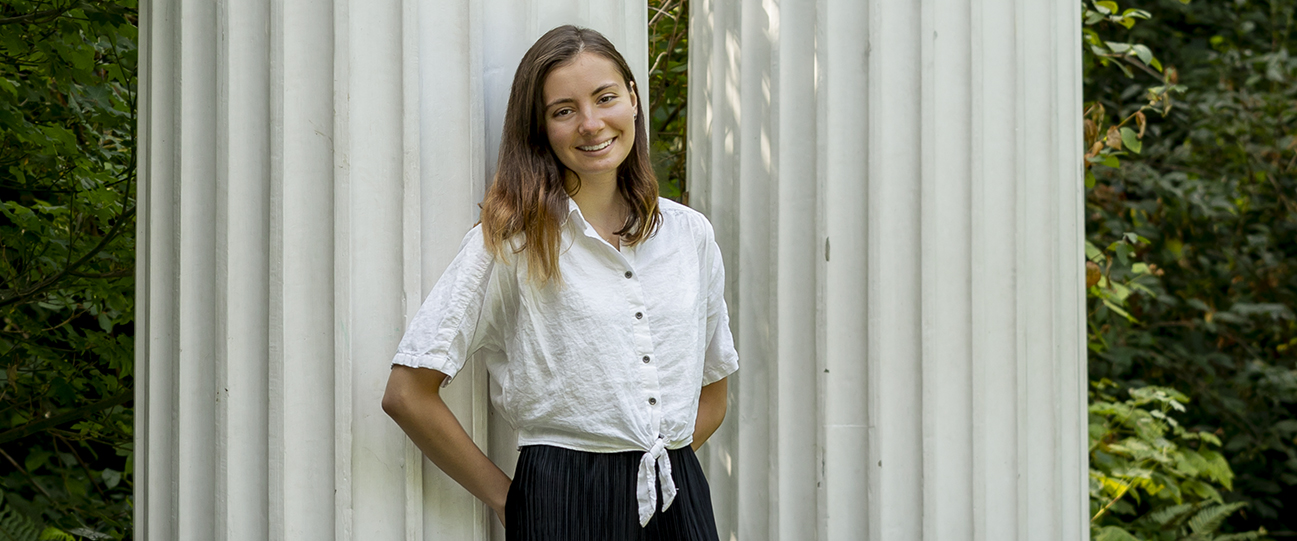From an early age, UW junior Allison Dumitriu Carcoana knew she wanted to be a doctor. Her commitment to a medical career has only grown stronger since she arrived at the University. So of course she chose to major in…Italian.
Sì. Italiano.
“People I meet are always very surprised and intrigued,” says Carcoana, who currently serves as president of the Italian Club. “But being pre-med allows you the flexibility to major in whatever you want, so I decided it would be best for me to spend four years studying something that touches me in a very different way than medicine does.”

While medical schools require that applicants complete specific science courses, there are no restrictions on applicants’ undergraduate majors. In fact, humanities majors have a 50 percent acceptance rate for medical school — higher than the overall acceptance rate of 41 percent. And studies have found that they perform as well, if not better, than their peers with science backgrounds during medical school and in residency.
For Carcoana, the decision to major in Italian had nothing to do with those statistics. She simply loves languages and literature. As an Italian major, she analyzes literature with an emphasis on cultural and historical influences. She also has studied French, Spanish, Italian, Ancient Greek, and Latin, and is a native speaker of Romanian.
“I think studying language can be valuable for anyone who goes into a career that involves communication with people,” she says. “Working with languages gives you different perspectives. You put yourself in other people’s shoes. It opens your eyes the same way that travel does, and makes your mind malleable to understanding situations in different ways.”

Carcoana also finds that literature reveals the timelessness of human psychology. She demonstrated this in a paper that explores parallels between Il Principe (The Prince), a political treatise by sixteenth-century political philosopher Niccolò Machiavelli, and Donald Trump’s Presidential campaign. The paper, written in Italian, won a 2018 Library Research Award for Undergraduates.
Carcoana explains that Il Principe focuses on tactics to build and maintain power in a divisive society. Machiavelli suggests tearing down the ego of one group and building up the ego of another — “the antagonistic elite” — while also identifying and addressing a few concerns shared by both groups. Carcoana argues that Trump did this in the recent Presidential election, focusing on taxes and national security while his opponent Hillary Clinton emphasized issues that polled as less important, including LGBTQ and women’s rights. “Machiavelli says those shared issues are where you negotiate,” Carcoana says. “The rest of the time you focus on the ego of the elite. This approach worked for Trump, which no one was expecting.”
Working with languages...makes your mind malleable to understanding situations in different ways.
Though Carcoana was immersed in research for her award-winning paper, she also found time for research of a different sort at UW Medical Center (UWMC), studying a viral infection caused by cytomegalovirus (CMV). People with suppressed immune systems are at higher risk of the infection, so transplant patients on immunosuppressive medications are prescribed an anti-viral prophylaxis that is effective but potentially toxic. Carcoana was part of a team that evaluated how the length of the anti-viral treatment affected outcomes in heart transplant patients. She will present the team’s findings at an infectious disease conference in October, and will be a co-author on a paper about the research.
There’s no doubt that Carcoana’s medical research experience will interest medical schools. But she thinks her humanities background should interest them as well.
“What appeals to me about medicine is that it is a combination of art and science,” she says. “There is a lot of scientific knowledge involved, but you also need a certain empathic ability. You have to be able to communicate well with different types of people, and you need to have a passion to make a difference. I think that’s where the art comes in. And the more I read literature and explore languages, the better I feel I understand individuals and their needs in society. Reflecting on that makes me come alive.”
More Stories

AI in the Classroom? For Faculty, It's Complicated
Three College of Arts & Sciences professors discuss the impact of AI on their teaching and on student learning. The consensus? It’s complicated.

What Students Really Think about AI
Arts & Sciences weigh in on their own use of AI and what they see as the benefits and drawbacks of AI use in undergraduate education more broadly.

A Love of Classics and Ballroom
Michael Seguin studied Classics at the UW and now owns Baltimore's Mobtown Ballroom. The two interests, he says, are more connected than they might seem.